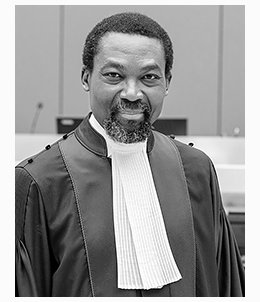 In this episode I speak with Chile Eboe-Osuji, former President of the ICC and Distinguished International Jurist at the Lincoln Alexander School of Law, Toronto Metropolitan University in Canada. We discuss why the ICC cannot prosecute crime of aggression in Ukraine and what some of the better alternatives that are currently being debated, as well as the jurisdiction and immunity issues that might arise for some forms of tribunal established for that purpose. We also discuss how other war crimes should be prosecuted, how to think about the claims of genocide. More broadly, we discuss how the war might provide an impetus for improving the international order, beginning with the establishment of a right to peace, amending the Rome Statute to expand the jurisdiction of the Court for the crime of aggression, restoring the jus ad bellum regime, and generally strengthening international criminal justice. A wide ranging and fascinating discussion!
In this episode I speak with Chile Eboe-Osuji, former President of the ICC and Distinguished International Jurist at the Lincoln Alexander School of Law, Toronto Metropolitan University in Canada. We discuss why the ICC cannot prosecute crime of aggression in Ukraine and what some of the better alternatives that are currently being debated, as well as the jurisdiction and immunity issues that might arise for some forms of tribunal established for that purpose. We also discuss how other war crimes should be prosecuted, how to think about the claims of genocide. More broadly, we discuss how the war might provide an impetus for improving the international order, beginning with the establishment of a right to peace, amending the Rome Statute to expand the jurisdiction of the Court for the crime of aggression, restoring the jus ad bellum regime, and generally strengthening international criminal justice. A wide ranging and fascinating discussion!
Materials:
– “A Pheonix Moment? International Law After Ukraine,” David B. Goodman Lecture, University of Toronto Faculty of Law, April 2022.
– “Immunity Before International Courts: How There Never Was,” lecture, Western University, Nov. 2021.
Reading Recommendations:
– Documents and records of the Paris Peace Conference, 1919 (link is to only one online source to archival material).
– Documents and records of the London Conference, 1945. (link is to only one online source to archival material).
 In this episode I speak with
In this episode I speak with 


 In this episode I speak with Samuel Moyn, who is a Professor of Jurisprudence at Yale Law School and Professor of History at Yale University. Sam has written a number of books on issues at the intersection of history and international human rights, but we here discuss his most recent book, Humane: How the United States Abandoned Peace and Reinvented War. Taking off from an insight of Leo Tolstoy’s, the book provocatively explores how an increasing focus on the humanization of war may have made us more accepting of armed conflict, and thereby undermined the movement to constrain the resort to war. In our discussion we explore some of the historical accounts that form the premises of this argument, including the claim that IHL did little to make war more humane until after the Vietnam war, particularly in the history of Western conflicts with non-white peoples; how armed conflict become far more humanized in the so-called “global war on terror;” and how this increasing focus on humanizing war has resulted in a corresponding decline in efforts to constrain the resort to war. We dig into the nature and implications of this claimed inverse relationship, and what forces and actors he thinks help to explain the phenomenon, and end with the question of what might might be done, and by whom, to address the problem of this declining focus on preventing war – an urgent question in the circumstances.
In this episode I speak with Samuel Moyn, who is a Professor of Jurisprudence at Yale Law School and Professor of History at Yale University. Sam has written a number of books on issues at the intersection of history and international human rights, but we here discuss his most recent book, Humane: How the United States Abandoned Peace and Reinvented War. Taking off from an insight of Leo Tolstoy’s, the book provocatively explores how an increasing focus on the humanization of war may have made us more accepting of armed conflict, and thereby undermined the movement to constrain the resort to war. In our discussion we explore some of the historical accounts that form the premises of this argument, including the claim that IHL did little to make war more humane until after the Vietnam war, particularly in the history of Western conflicts with non-white peoples; how armed conflict become far more humanized in the so-called “global war on terror;” and how this increasing focus on humanizing war has resulted in a corresponding decline in efforts to constrain the resort to war. We dig into the nature and implications of this claimed inverse relationship, and what forces and actors he thinks help to explain the phenomenon, and end with the question of what might might be done, and by whom, to address the problem of this declining focus on preventing war – an urgent question in the circumstances. In this first episode of Season 3 of the podcast, I speak with
In this first episode of Season 3 of the podcast, I speak with  In the last episode of Season 2, I speak with
In the last episode of Season 2, I speak with  In this episode, I speak with
In this episode, I speak with 

 In this episode I discuss the legal issues raised in the Gaza conflict of May 2021, with Professors
In this episode I discuss the legal issues raised in the Gaza conflict of May 2021, with Professors  In this episode, I speak with
In this episode, I speak with  In this episode I speak with Yasuyuki Yoshida, Professor of International Law at Takaoka University in Toyama Japan, and former Captain(N) in the Japanese Maritime Self-Defence Force. We discuss Japan’s posture on various aspects of the jus ad bellum regime, and whether or how its position may have changed as a result of the “reinterpretation” of Article 9 of the Constitution of Japan. Article 9 famously renounces the threat or use of force, and has long been understood to prohibit any collective self-defense or use of force authorized by the UN Security Council, but in 2014 the government purported to “reinterpret” the provision to relax its constraints. We discuss how the new policy relates to the jus ad bellum, and what Japan’s position is on a number of the more controversial elements of the doctrine of self-defense. The discussion includes surprising insights on how Japan would view a Chinese incursion on the Senkaku Islands, whether Japan would help defend Taiwan, and whether the US could invoke collective self-defense of Japan for preemptive strikes on North Korea. Another fascinating conversation!
In this episode I speak with Yasuyuki Yoshida, Professor of International Law at Takaoka University in Toyama Japan, and former Captain(N) in the Japanese Maritime Self-Defence Force. We discuss Japan’s posture on various aspects of the jus ad bellum regime, and whether or how its position may have changed as a result of the “reinterpretation” of Article 9 of the Constitution of Japan. Article 9 famously renounces the threat or use of force, and has long been understood to prohibit any collective self-defense or use of force authorized by the UN Security Council, but in 2014 the government purported to “reinterpret” the provision to relax its constraints. We discuss how the new policy relates to the jus ad bellum, and what Japan’s position is on a number of the more controversial elements of the doctrine of self-defense. The discussion includes surprising insights on how Japan would view a Chinese incursion on the Senkaku Islands, whether Japan would help defend Taiwan, and whether the US could invoke collective self-defense of Japan for preemptive strikes on North Korea. Another fascinating conversation!